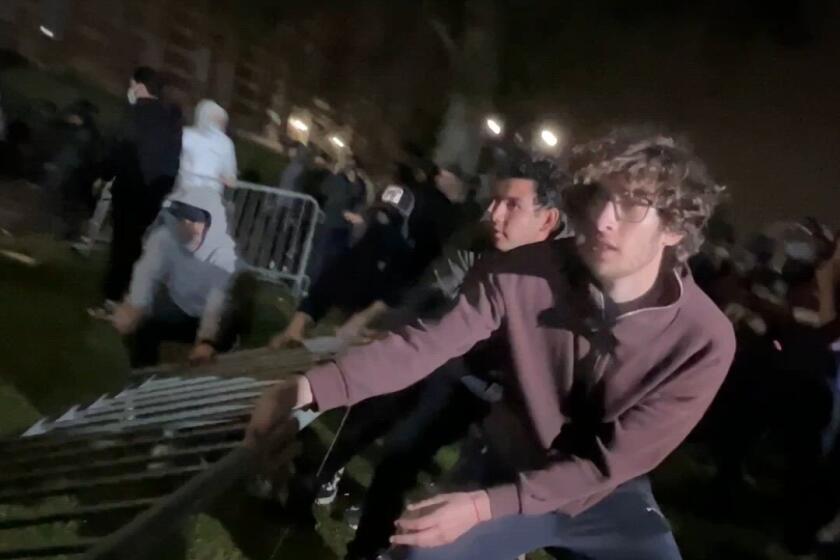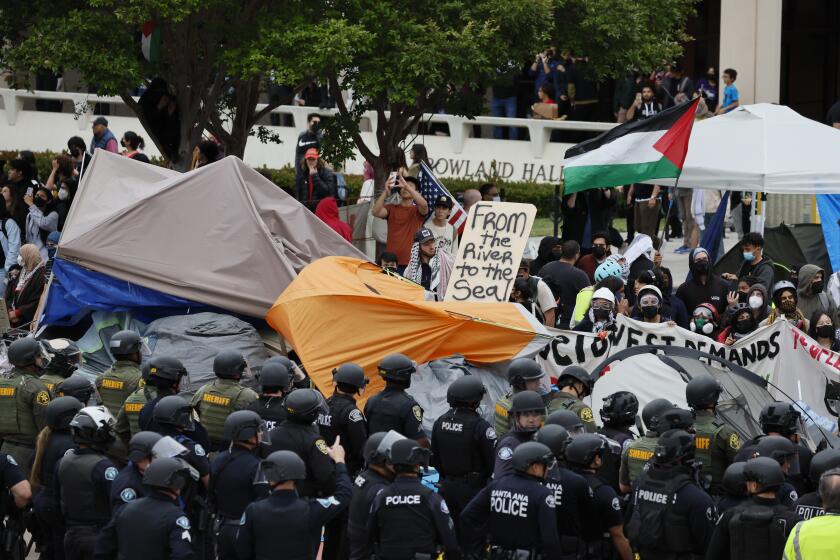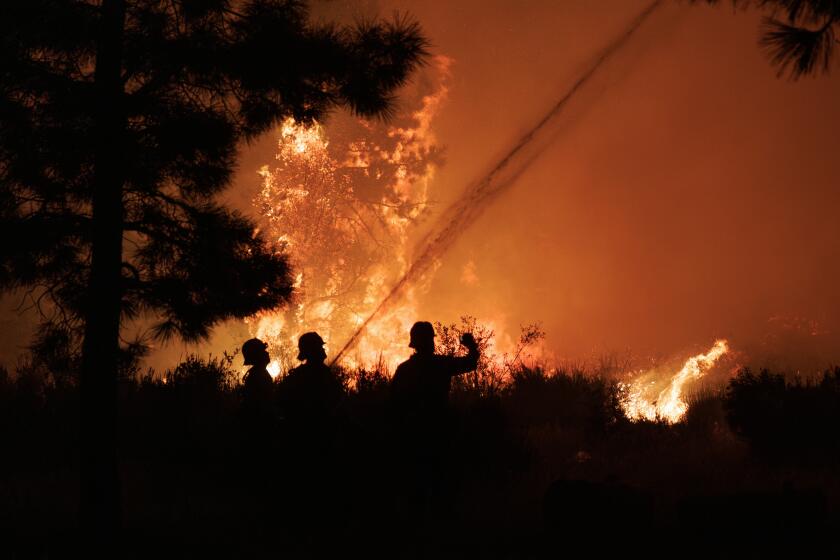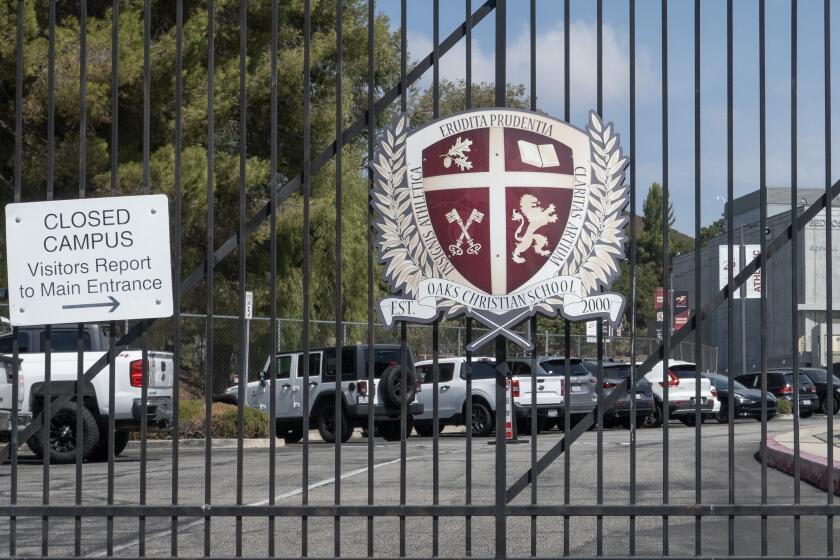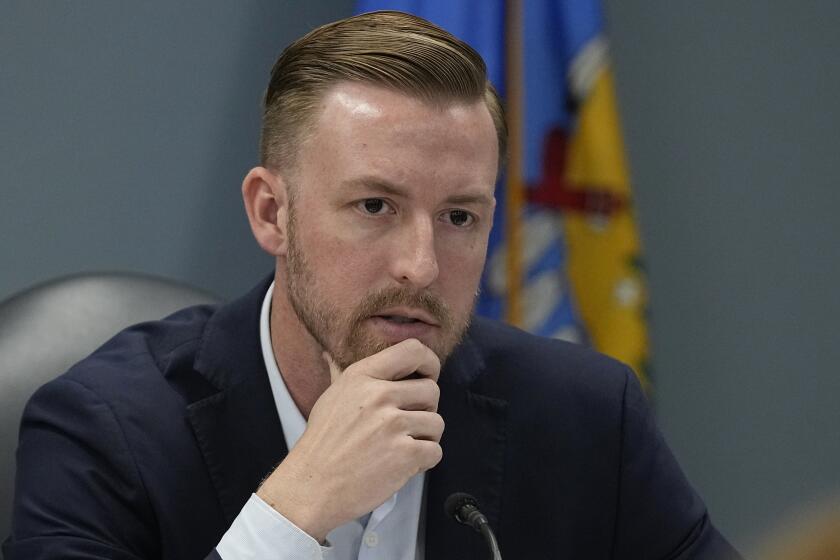UCLA students and faculty raise alarm on antisemitic and anti-Palestinian hate amid ongoing protests

- A survey by the UCLA Task Force to Combat Antisemitism and Anti-Israeli Bias found antisemitism has gotten worse since Oct. 7, 2023.
- An earlier report by the Task Force on Anti-Palestinian, Anti-Muslim, and Anti-Arab Racism decried suppression of pro-Palestinian speech.
- Tensions continue to roil UCLA amid new protests, lawsuits and strict protest rules.
To one group, UCLA has become a hotbed of antisemitism and anti-Israeli bias, a campus led by an administration that has not taken enough action to address pro-Palestinian demonstrations that violate university rules and veer into anti-Jewish tropes and slogans.
To another, the university has become a site of repression against Muslim, Arab and Palestinian American voices, with excessive security patrols and strict free expression rules that clamp down on pro-Palestinian protesters and their demands that the university divest from ties to Israel’s military.
More than a year after the Oct. 7 Hamas attack on Israel and the nation’s retaliatory war in Gaza ignited campus protests — and nearly six months since a violent mob stormed a UCLA pro-Palestinian encampment — dueling university task forces and divided students and faculty have painted contrasting pictures of the Westwood campus still reeling from its tumultuous spring.
UCLA’s Task Force to Combat Antisemitism and Anti-Israeli Bias this week publicly released a 93-page report submitted to the university’s interim Chancellor Darnell Hunt describing “broad-based perceptions of antisemitic and anti-Israeli bias on campus” that have increased over the last year.
In a survey of hundreds of students, faculty and staff members, it found sizable numbers have considered leaving for degrees or jobs elsewhere, saying they experienced hostility from peers because of their Jewish, Israeli or pro-Israel identities or otherwise have felt abandoned on campus.
The report cited more than 100 Jews or Israeli Americans at UCLA who said they were attacked or threatened in the last year for their identity, and several instances of chalked or spray-painted displays of swastikas on buildings, in classrooms or on campus sidewalks since Oct. 7, 2023.
In several cases, the report cited disrespectful uses of the Star of David, such as a chalking of the symbol on campus property with the star accompanied by the words “step here.” The star is a Jewish symbol that appears prominently on the Israeli flag and the emblem of the Israel Defense Forces. The report also cited messages explicitly targeting Israelis, such as a sign during a campus protest that said “Israelis are native 2 hell.”
The publication followed two reports — in April and June — from the UCLA Task Force on Anti-Palestinian, Anti-Muslim, and Anti-Arab Racism that decried a campus that’s “less safe than ever” for those groups and criticized “increased harassment, violence, and targeting” of them. A third report is in the works.
Counterprotesters tried to tear down the barricades surrounding the encampment.
Both tasks forces were commissioned last fall and winter in response to complaints over hate incidents, protests and a breakdown in campus relations on opposing sides of the Israeli-Palestinian conflict. UCLA made international headlines for the April 30 melee at a pro-Palestinian encampment when agitators attacked protesters as understaffed police stood by for hours waiting for reinforcements. On May 2, police made more than 200 arrests and dismantled the camp.
The groups’ calls for changes, from policing to free speech issues, are not binding, and come as the university is grappling with another season of protest and debate over what constitutes hate speech.
Ongoing lawsuits, protests and restrictions
On Tuesday, a group of pro-Palestinian students and faculty filed a lawsuit in state court, alleging that the university violated their 1st Amendment rights when it cleared the spring encampment and wrongly subjected them to disciplinary measures over protesting.
In the suit, two professors and students who were part of the encampment alleged UCLA “unlawfully caused the arrests of students and faculty engaged in nonviolent protest.” The protesters, represented by the ACLU of Southern California, have asked the court to force UCLA police to no longer declare “unlawful assembly” when demonstrations violate only university policy — reserving the order to acts of violence or if demonstrators appear to be breaking criminal laws.
The suit alleges that UCLA has shut down encampments this year using an incorrect interpretation of California penal code over unlawful assembly. Plaintiffs also want UCLA to expunge “any arrest or discipline records” related to their involvement in the encampment.
In August, a federal judge in a separate case ordered UCLA to ensure equal access to Jewish students, three of whom alleged that the university enabled encampment protesters to block Jews from parts of campus.
The University of California will enforce rules against encampments, blocking pathways and wearing some face masks as students begin returning to campus after a protest-filled spring, the system president told the UC community.
The legal actions come as UCLA and the UC system have made major changes in how they deal with protests. The University of California has declared a system-wide zero-tolerance for encampments and banned the use of masks to conceal identity while breaking the law. A new UCLA safety chief is overhauling procedures. And the vast majority of campus is now off-limits to unpermitted protests as more private security guards patrol.
Still, task force members on both sides said more needs to be done.
Last spring, “campus leadership repeatedly failed to enforce its own rules,” said Richard Steinberg, a UCLA law professor and member of the antisemitism task force. “A central question this year is whether that will change — whether campus leadership will enforce the rules and the law, and discipline those who violate them. So far this year, campus leadership’s rule enforcement pattern is not encouraging.”
As an example, he pointed to a pro-Palestinian march on the Oct. 7 anniversary that took place in unpermitted zones, but did not result in citations or arrests of students or staff who violated UCLA policies. In a previous interview with The Times, Rick Braziel, UCLA’s chief safety officer, declined to say why there was no action in response to the Oct. 7 protest. He said no arrests were made because there was not significant disruption to campus operations, which is what triggers an unlawful-assembly declaration and the threat of citation.
UCLA’s top security chief, hired after protest violence last spring, speaks out on campus safety plan amid faculty concerns about excessive police presence.
Events unfolded differently beginning Monday morning, when pro-Palestinian Jewish and non-Jewish students erected a tent-like structure in observance of the Jewish holiday of Sukkah in an off-limits central campus court. Campus officials told the group to end its protest, but the demonstration grew throughout the day and a few tents popped up. Later, an unidentified group tore apart the Sukkah, police issued a dispersal order, and activists voluntarily left the site in the late evening.
Findings on antisemitism and anti-Israeli bias
The report Steinberg helped compile asked 428 UCLA community members who are Jewish, Israeli or both about anti-Jewish incidents or sentiments, the spring encampment, and if they viewed the campus as getting better or worse for Jews. Respondents included faculty, lecturers, staff and administrators as well as students at every level.
It found that 84% believed that antisemitism had “worsened or significantly worsened” since Oct. 7, 2023. About 70% said the spring encampment was “a source of antisemitism,” and about 40% said they experienced antisemitic discrimination in their time at UCLA. Forty-one percent said they thought of leaving UCLA due to antisemitism or anti-Israeli bias— a view that was most common among faculty.
Respondents were contacted via Jewish campus organizations, including the Jewish Faculty Resilience Group, Chabad, Hillel, Jewish Voice for Peace, and the Jewish Muslim Alliance. Students for Justice in Palestine, a group that includes Jews, was not asked to participate.
The task force said it reached out to Zionist, non-Zionist and anti-Zionist Jews. It asked respondents about antisemitism but did not define the term. The words “Zionist” or “Zionism” also did not appear in the survey.
The report did not estimate the total population of Jewish and Israeli American community members at UCLA. But authors said it represented among the most detailed picture of Jewish views on campus.
Study of anti-Palestinian, anti-Muslim and anti-Arab racism
Members of a UCLA’s Task Force on Anti-Palestinian, Anti-Muslim, and Anti-Arab Racism and the Faculty for Justice in Palestine chapter contend that pro-Palestinian protests are not antisemitic. Many pro-Palestinian activists, they point out, are Jewish.
Saree Makdisi, a professor of English who is part of the task force, said criticism of Israel is too often equated with antisemitism.
“It’s as if criticizing South Africa meant you were anti-white or if criticizing Saudi Arabia means you are anti-Sunni,” he said, referring to that kingdom’s dominant Islamic sect.
“What we are seeing in this university is the systematic marginalization of one set of human lives and one set of constituencies — Palestinian American, Arab American, Muslim American and Palestinians in general. Not treating them on the basis of equality. Not safeguarding their access to the university in terms of free speech and their right to expression,” Makdisi said.
The task force he serves on did not poll the community about anti-Palestinian, anti-Arab or anti-Muslim sentiment, but made recommendations about ways to improve the environment for them on campus.
The group has called for a “thorough, independent investigation of law enforcement, the administration, and forces (internally and externally) who violently assaulted student protesters” in the spring.
UC police are asking for pepper balls, sponge rounds, launchers, drones and other weapons in their annual requests. UC says they are mostly for training.
The University of California has hired 21CP Solutions, a consulting group led by former police chiefs of Philadelphia, Seattle and other major cities, to analyze UCLA policing. But the task force rejects “the idea that highly paid consultants with direct ties to law enforcement can conduct a serious, critical, objective investigation.”
The task force is also calling for the “rapid reduction of police and private security on campus, the elimination of the Office of Public Safety” and the dismissal of the new chief safety officer, Braziel, who was hired in response to the spring’s violence.
Braziel, who is in a short-term position, has said he is hoping to make changes on campus so that “police are seen as part of the family, not an invading army,” such as by having security officers wear blue-and-gold UCLA polo shirts instead of black shirts. He acknowledged that a large and visible police presence on campus can be counter-effective and that fewer security officers could be deployed with better training.
UCLA response
UCLA said it had received the report on antisemitism and anti-Israeli bias, which is under review.
“Interim Chancellor Hunt is appreciative of the task force’s thorough and thoughtful work on this sensitive issue during a very challenging time for our community,” a university statement said, adding that he will “determine the best ways for UCLA to strengthen our ongoing efforts to combat antisemitism and protect the well-being of the entire Bruin community.”
UCLA, convulsed with protests over the Israel-Hamas war last spring, unveiled a plan to rebuild community ties with enhanced safety measures, broader dialogue.
The Times also asked UCLA to comment on the reports from the Task Force on Anti-Palestinian, Anti-Muslim, and Anti-Arab Racism, but did not receive a response.
Last month, UCLA launched a “four-point” plan to create a more welcoming campus environment for all of its more than 50,000 students, faculty and staff members. In addition to a renewed focus on community safety and changes to protest rules, it announced a speaker series on “challenging but empathetic conversations.” That includes an upcoming Nov. 13 event featuring Yasmeen Abu Fraiha, an Israeli Bedouin physician and fellow with the Middle East Initiative at Harvard’s Kennedy School.
The university also plans “Speaking Across Conflicts” workshops as well as programs for student internships and teaching fellowships that focus on effective dialogue. Much of the programming will stem from the UCLA Bedari Kindness Institute and be led by David Myers, a professor of Jewish history who has focused on bridge-building.
Times staff writer Teresa Watanabe contributed to this report.
More to Read
Sign up for Essential California
The most important California stories and recommendations in your inbox every morning.
You may occasionally receive promotional content from the Los Angeles Times.

